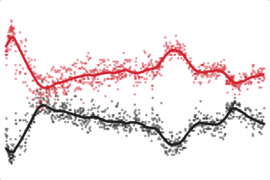Public opinion experts–I do not consider myself one of them, mind you–use a variety of techniques to tap into how people perceive our nation’s health and welfare. One of the most popular is the right track/wrong track question, which is usually worded like, “do you think America is headed in the right direction or on the wrong track?” We usually put these numbers together and determine whether the right direction is larger or smaller than the wrong track. Right now, nearly twice as many think “wrong track.”
As the above figure (based on the average score taken from a variety of polls aggregated by The Huffington Post) shows, the gap between those who say right direction and those who say wrong track is steadily widening throughout this year. In fact, you should notice that the gap has been generally wide throughout the Obama presidency, only narrowing only around the presidential elections, and expanding again to where we are now.
These kinds of numbers, like any national indicator (presidential approval ratings are another example), tempt us to read too much into them. Polling is inherently difficult and fraught with methodological problems. It is a snapshot of a moment in time and little else. Let’s consider just a couple of issues. First, most people, when asked these kinds of questions, answer based on very little information. At best, these are very general impressions and not hard-won attitudes based on evidence or argument or experience. As John Zaller, a famed expert in this area, says, these are “top of the head” judgments made with little reflection. Given this, it is hard to generalize from these kinds of numbers toward any kind of over-arching truth, either about one person’s opinion, or about the nation’s collective opinion.
Second, even if we could do so, the American system does not easily lend itself to simple statements of good or bad or right or wrong. Our form of government is complex. There are many entities exercising an influence over our political economy. While people ascribe divine attributes to our president, and as his recent statements about the scandals blooming about him, he is neither omnipotent nor omniscient. He is the most important actor in our political pageant, but he cannot write the script or direct the other players who slink across the stage. We have two political parties, 535 voting members of Congress, and hundreds of others who pull a string here, or push an agenda there. So, if you think we are on the “wrong track,” who gets the blame?
In short, when it comes to assigning blame in our system of government, even something so simple as “right direction/wrong track,” most voters are hopelessly lost. They fixate on the President because that is simple, but, when the President brings all of his resources to bear during an election, he is, it seems, able to shake perceptions that exist and shape the new ones being built.
Third, the way we do polling is still in a bit of flux. One of the ‘secrets’ of the polling business is that the heavy majority of those contacted refuse to participate in the polls. So, we have a difficult time knowing if there is a difference between those who respond and those who do not. The self-selection bias skews many polling results and is challenging to overcome.
These sorts of numbers are always interesting, to be sure, but they often obscure as much as they reveal. Read them delicately, for they can bear little analytical weight, especially when we are so far removed from electoral signposts or other “focusing” events that draw people’s’ attention to the political process.

 Bert Wheeler
Bert Wheeler
 Jeff Haymond
Jeff Haymond
 Marc Clauson
Marc Clauson
 Mark Caleb Smith
Mark Caleb Smith
 Tom Mach
Tom Mach